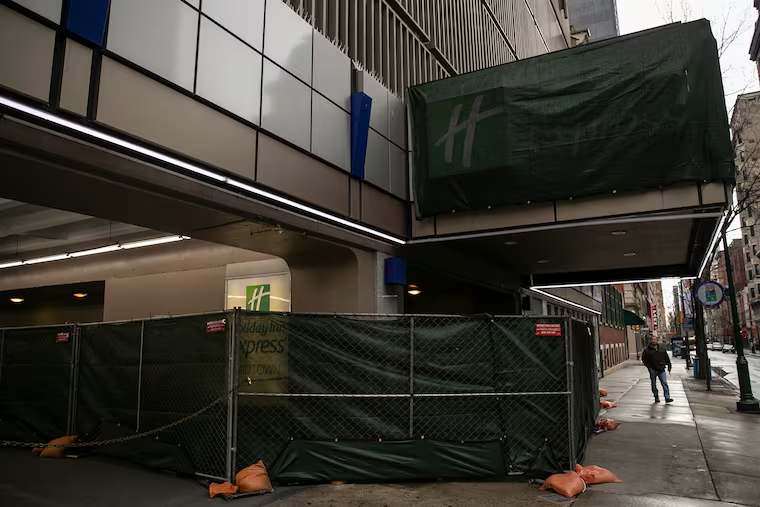Philly prepares to open Holiday Inn quarantine site amid questions about how to help the mentally ill and addicted
With the surge of COVID-19 cases expected to hit, city officials say the Holiday Inn could be just the first makeshift quarantine site in Philadelphia.

Philadelphia has begun housing coronavirus patients at the Holiday Inn Express in Center City — as part of the “soft launch” of a facility for anyone who can’t shelter in place — but officials are still grappling with questions about how to treat, protect, and quarantine people who are homeless, mentally ill, or deep in addiction.
With the surge of COVID-19 cases expected to hit in the coming weeks, city officials expect the 13-floor hotel with 150 rooms to be just the first makeshift quarantine site in Philadelphia, said city Managing Director Brian Abernathy. He said the city hopes to be able to offer 1,000 beds to anyone who can’t quarantine at home — or doesn’t have a home. He said the city is in talks with other properties that may make about 800 beds available.
“We’re building a plane as we fly it,” Abernathy said. “We may need to find a different location for some of these more challenging cases that isn't the Holiday Inn.”
That includes people with mental health issues who prefer the streets to the confines of a hotel room. People in addiction who need to stave off painful withdrawal from drugs. And people in recovery who rely on medication-assisted treatment, which often requires them to visit clinics in person.
In a public health crisis where the aim is to over-prepare, city officials have been consulting with Philadelphia’s Law Department on the legalities of quarantine: how to keep people inside, how to offer the services that will make them want to stay, and how to protect patients and the community.
Forcible quarantine, Abernathy said, is a point no one wants to reach. “There may be cases — I can’t name the parameters right now — where some lever we need to pull is actually pulled. We have our Law Department really reviewing that issue,” he said. “We are working through it from a social service lens as well — what can we do, legally, and what is right and best for the individual and community.”
No one in the city has been legally quarantined, and advocates say there are no plans for those kind of restrictions in the near future.
While the city prepares the hotel, others who work with people on the streets are scrambling to keep them safe however they can — from the coronavirus to the medical conditions their often-compromised immune systems are already dealing with.
Bill Kinkle, a care coordinator at the addiction treatment center Clean Slate, said many of his patients are even more vulnerable amid coronavirus cutbacks, with food cupboards closing and regular meals harder to come by. Social distancing, he said, becomes an afterthought.
“Their main motive is staying alive right now. Transmission of coronavirus is a far second,” he said.
Providers have been encouraged by the lifting of some federal restrictions on the prescription of addiction treatment medications like buprenorphine, and the city is figuring out how to offer medication-assisted treatment in quarantine spaces such as the Holiday Inn. In the meantime, Kinkle has been taking advantage of the loosening of restrictions by walking Kensington Avenue — the heart of the city’s opioid crisis — with a smartphone, asking people if they’d like to start buprenorphine treatment by video-chatting with a doctor. About half a dozen have accepted.
Thomas Nestel III, the chief of SEPTA Police, said the city has sent outreach workers out with his officers who patrol El stations along Kensington Avenue. Philadelphia police this week rode the avenue with lights and sirens on, warning people through their cars’ PA system to socially distance.
“The big problem is people are not socially distancing,” Nestel said, which can be especially dangerous for a population with little immune protection as it is.
Given the crunch at the shelters, more homeless people have sought overnight shelter on the El, he said. Along with the social workers, Nestel has stationed officers at the beginning and end of subway lines to clear the trains of those riding back and forth.
“We want to make SEPTA transportation for those who need the transportation — frontline workers," he said. "Obviously social distancing is important for us, and if the trains are filled with a vulnerable population, we are not able to establish that distance.”
The Holiday Inn is set to open at a time where the already-strapped shelter system has had to cut services and, in many cases, beds.
The Sunday Breakfast Rescue Mission, the city’s largest shelter for men, has reduced the number of people it can shelter by more than half. One guest there tested positive for COVID-19 last week, the only person in a city shelter so far to test positive, said Sunday Breakfast’s president, the Rev. Jeremy Montgomery. When the man was admitted to a hospital on March 20, Sunday Breakfast stopped taking new guests, Montgomery said. The man is currently quarantining in an apartment in Northern Liberties provided by the city.
No one else at Sunday Breakfast has shown any symptoms, Montgomery said. But in the meantime, to keep guests safely distant, the shelter has cut back from its full capacity of 250 to only 44 guests on Monday night. The shelter plans to start accepting new guests again Thursday night, Montgomery said.
The plan is to send any potential guests who are showing virus symptoms to the Holiday Inn, he said.
Abernathy and Eva Gladstein, the city’s deputy managing director for health and human services, said the city is working to procure more sites for quarantine — and decide what services will work best at each site.
“The disease, and its impact on Philadelphia, is evolving every day,” Gladstein said. “We just have to be more agile.”